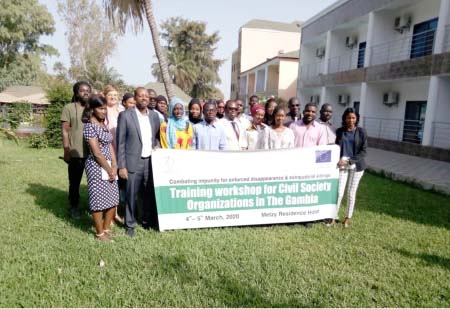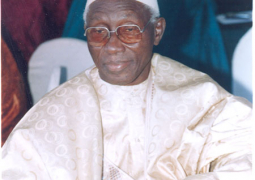
The
chairperson of the Association of NGOs in The Gambia (TANGO) has underscored
that the only way to know whether a democracy is working in a country is when
the instruments of democracy are being tested.
John
Charles Njie was speaking at a two-day capacity building workshop on the theme;
combating impunity for enforced disappearance and extra judicial killings for
Civil Society organisations in The Gambia.
Organized
by IHRDA in partnership with Trial International, the event seeks to train
participants on how to use level instruments to fight against enforced
disappearance, extrajudicial killings, advocate for justice and come up with
remedies.
“What
is seen in most cases is that people agitate and protest then that’s it, but
until we get to a point of testing our systems and able to test our judiciary
and National Assembly to see how independent they are, we will have a long way
to go,” he expressed.
Njie
recalled that when he took office as the chairman of TANGO, one of the cries in
his heart has been that as a nation ‘be able’ to begin to test their systems.
He
thus congratulated IHRDA for taking legal action against The Gambian government
when it comes to the issue of the public order act, adding that very soon it
will be heard that The Gambia has been found wanting and their authorities will
do what they are supposed to do.
When
it comes to holding government accountable, Njie made reference to the case of
HonourableYaKumbaJaiteh, adding that ‘if we continue to agitate and call on
government names, we will never know how effective and independent our
judiciary is’.
Edmund
Foley, director of programmes at IHRDA, outlined that the overall objective of
the forum is to prevent enforced disappearance and extrajudicial killings as
well as increase accountability of perpetrators in countries,thus improving the
search for victims.
“It
is also meant to strengthen the knowledge base of governmental and
non-governmental actors in the search for victims of enforced disappearance.
First we hope to look for cases to mitigate and as well build their capacity,”
he added
Mr.
Foley said thatthe forum is also aimed at increasing the number of cases that
they can file and use judicial mechanisms to seek remedies for victims and
their families.
“We
hope to mitigate these before the national courts and of course the competent
human rights mechanism. IHRDA also seeks to encourage and fight for fundamental
human rights of all persons and we see the Civil Society Organisations as key
partners and with the kind support from the European Union and
Trial International,we were able to conduct this training for institutions and
organisations” he stated,
Else
Boonstra, political officer, European Union delegation to The Gambia,
highlighted the efforts The Gambia is making to come to terms with its recent
past, reminding that as representatives in Civil Society Organisations they have
a major role to play in that process to see it to that those efforts reach
their full potentials and to seek remedies and justice for those that have
suffered injustices in the past.
“This
workshop will therefore, provide an opportunity for experts to give tangible
advice that will contribute to their everyday work and to strengthen their
capacity to hold accountable those that may be responsible for what has
happened in The Gambia,” she disclosed.
The
workshop, she went on, will create a platform for experts to explain regional
and international instruments on enforced disappearance and extrajudicial
killings and document cases by setting up of practical exercises to work on
interview techniques.
More
importantly, she added, it will create a platform to share knowledge on how to
use advocacy in the search for justice.


